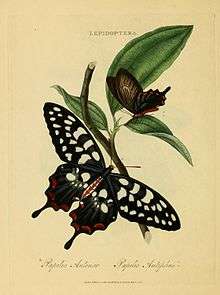Pachliopta antiphus
Pachliopta antiphus is a species of butterfly from the family Papilionidae (swallowtails) that is found in Sumatra, Borneo and the Philippines.[1]
| Pachliopta antiphus | |
|---|---|
 | |
| Pachliopta antiphus top right | |
| Scientific classification | |
| Kingdom: | |
| Phylum: | |
| Class: | |
| Order: | |
| Family: | |
| Genus: | Pachliopta |
| Species: | P. antiphus |
| Binomial name | |
| Pachliopta antiphus Page & Treadaway, 2003 | |
| Synonyms | |
| |
The larvae feed on Aristolochia.
Taxonomy
The taxonomic position of P. a. antiphus is uncertain. It is regarded as conspecific with Pachliopta aristolochiae by Tsukada and Nishiyama (1982) and Fujioka et al. but recognized as a separate species by Page & Treadaway (1995).
Subspecies
- P. a. antiphus
- P. a. acuta (Druce, 1873) – Philippines: Jolo, Mapun, Tawitawi, Sanga Sanga, Sibutu, Basilan
- P. a. brevicauda (Staudinger, 1889) – Philippines: Busuanga, Cuyo, Dumaran, Palawan
- P. a. elioti (Page & Treadaway, 1995) – Philippines: Siasi
The following subspecies are treated as junior synonyms of Pachliopta antiphus antiphus by Page & Treadaway (1995):
- Papilio aristolochiae poseidippus Fruhstorfer, 1911
- Papilio aristolochiae kameiros Fruhstorfer, 1911
gollark: Using specialized optics in some cases, or mist generation to recreate normal rainbow formation conditions.
gollark: There is actually research into artificial rainbow generation at small scales.
gollark: The modern economy is more efficient than that!
gollark: You think the gold at the end of rainbows is just left unused *sitting* there?
gollark: Actually, with modern satellite imaging and good cameras, prospecting companies are frequently able to track down the ends of rainbows and extract the gold within 10 minutes of materialization.
References
- Tsukada, E. & Nishiyama, Y. 1982. Papilionidae. In: Tsukada, E. (ed): Butterflies of the South East Asian Islands. Volume 1. Plapac Co., Tokyo
- Fujioka, T., Tsukiyama, H. & Chiba, H. 1997. Japanese Butterflies and their Relatives in the World I. [Japan]. 3 volumes, 301 pp., 196 pp., 162 pls.
- Page M. G.P & Treadaway,C. G. 2003 Schmetterlinge der Erde, Butterflies of the World Part XVII (17), Papilionidae IX Papilionidae of the Philippine Islands. Edited by Erich Bauer and Thomas Frankenbach Keltern: Goecke & Evers; Canterbury: Hillside Books. ISBN 978-3-931374-45-7
External links


- External images
This article is issued from Wikipedia. The text is licensed under Creative Commons - Attribution - Sharealike. Additional terms may apply for the media files.